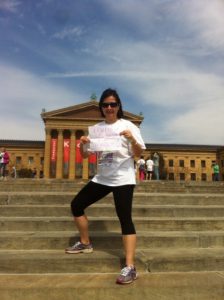Move more month
Connecting people with local opportunities to get active through exercise prescription
April is “move more” month, an initiative to encourage people to take part in physical activity with the goal of incorporating it into daily routines.
Research into the benefits of physical activity has been widespread, with numerous studies echoing the importance of physical activity for health and mental wellbeing. But what motivates people to start exercising? And, more importantly, what are the factors that turn exercise into a habit?
Dr Gozde Ozakinci, senior lecturer in health psychology at University of St Andrews, has been studying behavioural interventions – specifically looking at physical activity and social prescribing of exercise and how community-led approaches can be beneficial to starting and maintaining physical activity. Social prescribing has had a long history and focuses on helping patients who are experiencing a wide range of physical, mental health and wellbeing issues by connecting them with relevant opportunities in their local community.
Her research has been in partnership with “parkrun” and jogscotland. Parkrun is a community-led organisation that includes weekly events for walkers, runners and volunteers that take place every Saturday morning. These events, as Dr Ozakinci says, are “not just for fast runners, but are inclusive events where everyone is encouraged to set their own goals and pace.” Jogscotland helps those who are new to jogging through local jog groups in their local setting with the support of a jog leader and a group.
These community-led initiatives promote inclusivity to try and take away the daunting aspect of physical activity and, instead, turn it into a fun social activity that increases the level of connectedness between group members. “Parkrun” and “jogscotland” both promote positive, welcoming environments where “no one finishes last, and everyone is welcome.”
During COVID-19 physical activity has become both a mental health and wellbeing necessity, with rules limiting how often, with whom and how people can exercise. With sudden and rapid changes to how individuals work, socialise and live, physical activity has become extremely important for both psychological space and physical space. For Dr Ozakinci and others whose research is around physical activity, this time has become a very important research basis for uncovering what motivates people to exercise and ways to make physical activity more accessible.
A self-proclaimed “slow runner”, Dr Ozakinci’s main goal for exercise is making time during her day to get outside and run – at whatever pace feels comfortable. For those wondering where to start with physical activity, Dr Ozakinci offered a few helpful tips:
- Do an activity that feels fun for you – there’s no one way to exercise, so finding something you enjoy will make it easier to get started and continue.
- Set achievable goals for yourself and start with small goals
- Try turning it into a social activity by joining a community group where you can find support when running becomes hard.
